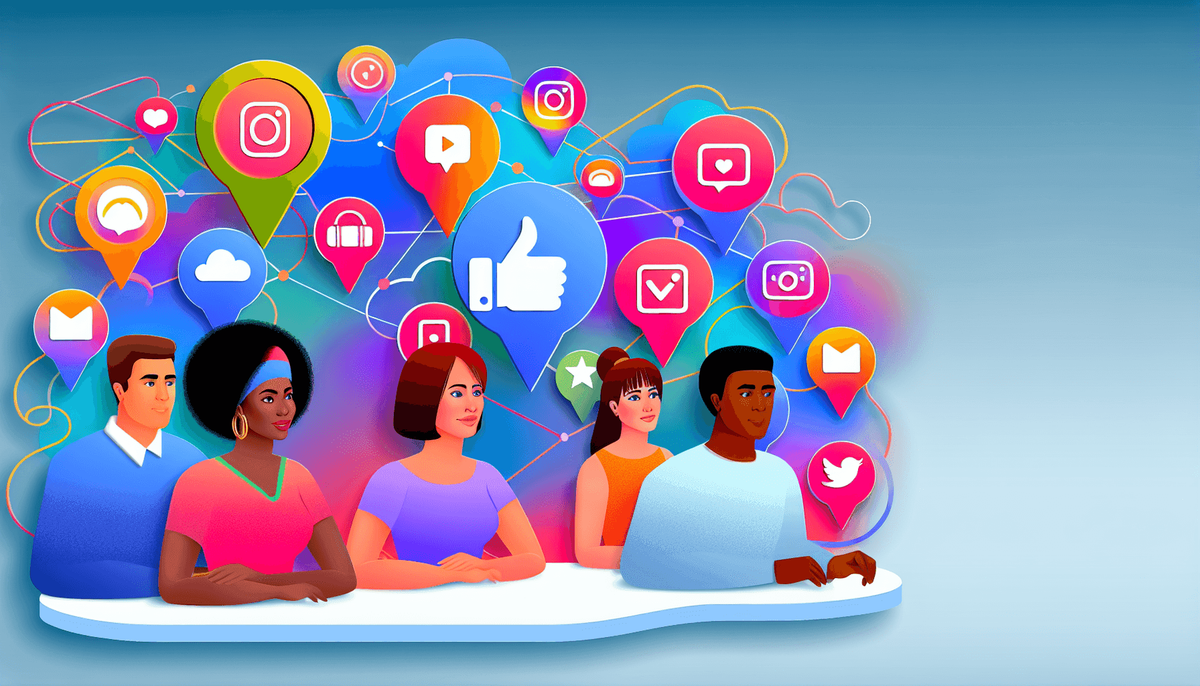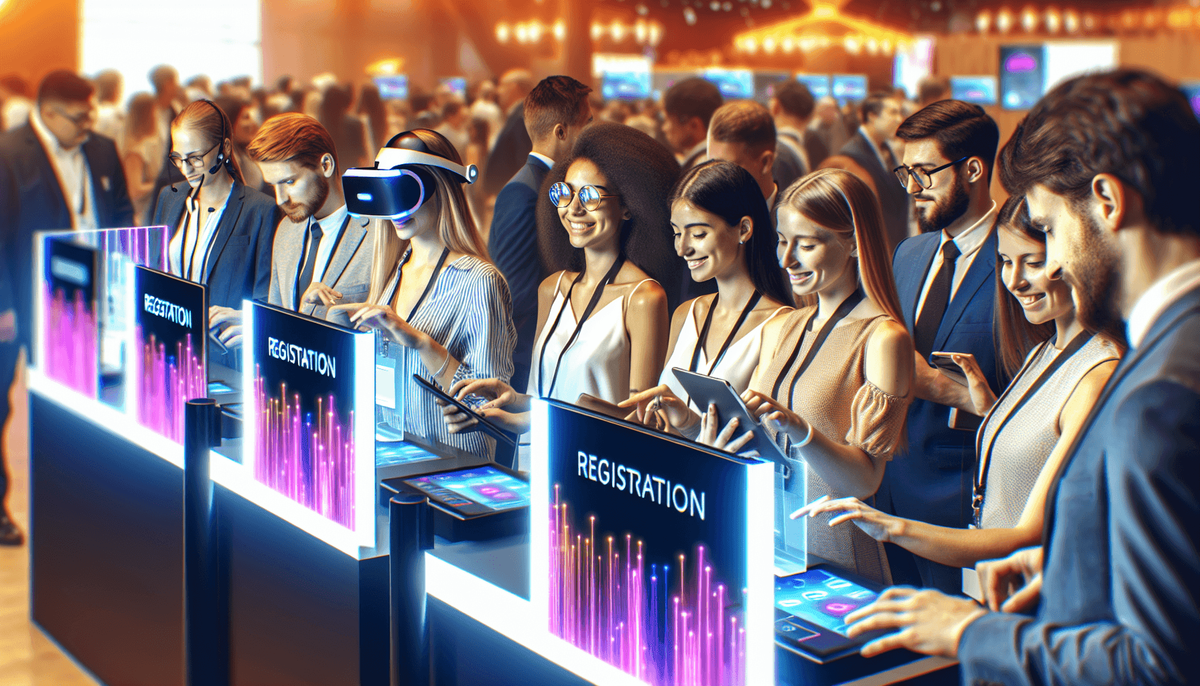Maximize Your Impact: Top Event Marketing Strategies for 2026

Welcome to the thrilling world of event marketing! As we gear up for 2025, let's delve into the top strategies to help you make a significant impact, foster connections, and drive business growth.
Quick Summary
In the realm of event marketing, strategies for 2025 emphasize a blend of digital and live experiences to forge personal connections and enhance brand loyalty. Key elements include setting SMART objectives, understanding the target audience, and selecting the right event type to maximize ROI. Leveraging technology and digital marketing channels boosts attendee engagement, while effective post-event analysis ensures continuous improvement, ultimately driving long-term business growth and robust c
Are you ready to take your event marketing game to the next level?
Key Takeaways
- Event marketing combines digital and live experiences to create personal connections and drive brand loyalty, making it an essential element of an effective marketing strategy that can produce long-term growth.
Ready to Grow Your Business?
Get a free consultation and custom strategy tailored to your goals.
- A successful event marketing plan requires clear, SMART objectives, a comprehensive understanding of your target audience, and careful selection of the most appropriate event type to maximize ROI.
- Leveraging technology, digital marketing channels and a strong event branding strategy enhances the attendee experience, promotes engagement, and assists in measuring event success to inform future improvement.
Defining Event Marketing

Where digital connection is king, event marketing stands tall as a powerful tool for promoting brands, products, and services. Whether conducted in-person or online, events are a golden opportunity to connect with prospective customers in a unique and engaging way. Creating a unique and exciting marketing approach that reflects your brand's culture can resonate with your audience.
Events are more than just a one-off occurrence; they are an integral part of a larger marketing strategy. They offer a valuable opportunity for personal one-on-one interactions that can build brand loyalty and contribute to your business's long-term growth. So, if you need to be more accurate with the power of event marketing, it's time to recalibrate your strategy.
The Essence of Event Marketing
Event marketing is more than merely planning marketing events. It involves:
- Creating and executing engaging events that interact with customers
- Cultivating leads
- Amplifying brand visibility
- Using exciting opportunities like contests and unique event experiences to boost engagement and create buzz through an effective event marketing landing page. This makes event marketing important in today's competitive landscape.
As the world grows more digital, events such as 'Fuckup nights' provide attendees with an exceptional and captivating experience. By showcasing behind-the-scenes work and featuring unconventional content, they address audiences' pain points, boosting their confidence and fostering tight-knit relationships within teams.
In-Person vs. Online Events
As the world becomes increasingly connected, both in-person and online events have found their place in the marketing landscape. Attending events in person, such as trade shows and conferences, offers a unique and valuable opportunity to connect with people in a way that online interactions cannot replicate. The physical presence of others and the ability to build meaningful relationships is a significant advantage of in-person events.
On the flip side, online events like webinars and virtual conferences offer to reach a worldwide audience at a fraction of the cost of physical events, eliminating travel barriers and increasing accessibility. The choice between in-person and online events depends on different factors, including your business objectives, resources, and the preferences of your target audience. By utilizing both formats together, event organizers can create a holistic approach that caters to a broader audience and maximizes the potential reach of their marketing campaign.
Crafting Your Event Marketing Plan

Behind every successful event lies a well-crafted marketing plan. Having clearly defined objectives, identifying the target audience, and selecting the appropriate type of event are essential components of an effective event marketing plan.
By setting SMART goals that are:
- Specific
- Measurable
- Achievable
- Relevant
- Time-bound
You can provide a clear and structured path toward achieving your objectives.
The primary goal of your event marketing plan should be to inspire potential attendees to register for the event. Thus, setting a marketing budget is crucial as it influences every aspect of the event experience, from securing a great venue to planning effective promotional activities.
Establishing Clear Objectives
Any successful event marketing plan is built upon the foundation of clear objectives. They help you identify the purpose, target audience, and measurable goals for your event, ensuring alignment with your broader marketing or business objectives.
A SMART event marketing goal should be:
- Specific: aiming to increase the prospective leads list by 100 names by the end of the event
- Measurable: providing a clear target for the marketing efforts
- Aligned with the overall business targets
This goal is not only specific and measurable, but it also aligns with the overall business targets.
Implementing such clear objectives for an event is a strategy worth celebrating.
Knowing Your Target Audience
It is crucial for the success of any event to understand the preferences and interests of the audience. When planning an event, consider the types of people who would benefit most from attending. This could include those who would enjoy your workshops, learn from your speakers, or engage with your sponsors.
Effective audience segmentation enables you to:
- Customize event experiences and marketing messages for specific segments.
- Make the most out of your event marketing by maximizing its impact.
- Tailor your event's marketing efforts to resonate with your target audience.
- Meet their needs and preferences.
Creating a targeted event marketing strategy is more effective and personalized.
Selecting the Right Event Type
Choosing the appropriate event type is fundamental in realizing your intended results and optimizing ROI. Your event type should align with your event's goals, resources, and audience preferences.
Whether it's a conference, seminar, or product launch, the type of event you choose will significantly impact your marketing ROI. By influencing factors such as registration conversions and overall event impact, choosing the appropriate event type can have a great impact on your marketing ROI.
Building a Magnetic Event Branding Strategy

Your event serves not only as a platform to connect with potential customers but also as a stage to display your brand. A strong event branding strategy, including a well-crafted theme and eye-catching promotional materials, ensures that your event stands out and creates a memorable experience.
Whether it's through a unique theme that aligns with your brand or creative promotional materials that draw attention, effective event branding helps to build brand awareness, leaving a lasting positive impact on attendees, driving positive brand equity, and potentially improving Customer Lifetime Value.
Developing a Unique Theme
An original theme can:
- Distinguish your event from competitors
- Aid in effectively communicating your brand message
- Reflect your event planner's creativity and vision
- Lead to a sense of enthusiasm, freshness, and excellence.
A well-thought-out theme can:
- Humanize your event branding.
- By creating an emotional resonance, you can not only capture your audience's attention but also leave a lasting impact on them.
Ready to Grow Your Business?
Get a free consultation and custom strategy tailored to your goals.
- Ensure that your brand message is clear and concise.
- Enhance your attendees’ experience.
- Help in building credibility, loyalty, recognition, and support for your event.
Designing Promotional Materials
Promotional materials, being the initial impression attendees have of your event, play a vital role in your event branding strategy. From your event website to social media graphics, every piece of promotional content should be designed to generate interest and drive registrations.
Current design trends in promotional materials include:
- The use of vibrant color palettes to capture attention
- The incorporation of experiential elements promising immersive experiences
- Innovative uses of materials that go beyond traditional print mediums
These strategies contribute to a standout event presence and ensure your event is unforgettable.
Leveraging Digital Marketing Channels

As the world shifts more towards an increasingly digital world, the importance of utilizing digital marketing channels for event promotion has heightened. Different channels, including content marketing, social media, and paid ads, are crucial for promoting events and expanding reach.
Social media offer a fantastic opportunity to promote events, while content marketing provides valuable insights and helps forge strong connections with the audience. Paid digital promotion, including search engine marketing and social media advertising, plays an effective role for events with larger budgets, helping them reach a broader demographic.
Social Media Savvy
Social media provides an economical method to interact with potential attendees, circulate event updates, and foster user-generated content. Platforms such as:
- TikTok
- Twitter (X)
Provide myriad opportunities to promote your live events.
Creating engaging social media content for event promotion can be as simple as designing fantastic graphics or as strategic as initiating targeted campaigns using in-platform keyword lists, topics, and geolocation details. Twitter, for instance, is a fantastic tool for gaining more followers and engaging with people interested in your event.
Content Marketing Mastery
Content marketing takes a central role in event marketing, producing captivating content varieties and offering supplementary information and resources to attendees. The use of diverse formats such as photos, videos, and quotes enriches the resources offered to attendees, extending the event's impact and fostering continuous engagement through social media and word of mouth.
Such content can include:
- Social media posts
- Videos
- Podcasts
- Webinars
- Ebooks
- Infographics
- User-generated content
These are chosen for their ability to attract, engage, and convert the target audience, extend the lifespan of the event, and create content that is perceived as relevant and trustworthy.
Paid Ads Precision
Paid ads serve as an efficient means to target a particular demographic and enhance your event's visibility. Some platforms you can leverage for paid advertisements include:
- Facebook Ads
- Twitter Ads
- Google AdWords
These strategies offer precision targeting options, significantly boosting your event's visibility to the desired audience. They enhance your event's visibility through attention-grabbing clips, collaborations with influencers, and increased awareness and brand visibility. It's a fantastic way to connect with the right audience and drive results.
Enhancing Attendee Experience Through Event Technology

Technology has brought about a transformation in how we plan and execute events. From registration and ticketing tools to interactive features, event technology can enhance the event attendees' experience and streamline event management processes.
Ready to Grow Your Business?
Get a free consultation and custom strategy tailored to your goals.
Event technology brings a multitude of benefits to the event registration process, such as personalizing the event planning, creating a branded registration website, and customizing the process based on attendee type.
Interactive Features at Events
Interactive features have the potential to augment attendee engagement and satisfaction. From live polls and Q&A sessions to networking platforms, these features can significantly enhance the attendee experience. They enable real-time interaction and empower speakers with valuable insights into attendee opinions, leading to more dynamic and engaging presentations.
Networking platforms offer immense benefits, such as the exciting opportunity to meet industry influencers, build professional relationships with peers, and connect with fellow entrepreneurs at a networking event.
Measuring Event Success and ROI
Once all the planning and execution are done, gauging the success of your event becomes critical. Analyzing post-event data, gathering feedback, and calculating the financial impact of the event on your business are essential steps in this process.
The key performance indicators (KPIs) that greatly contribute to assessing the financial success of an event include:
- Attendance
- Engagement
- Leads generated
- Revenue generated
- Customer conversion rates
- Brand awareness
Post-Event Analysis
Conducting a post-event analysis is essential in determining the success of your event. It involves examining various data collected during and after the event, including registration and attendance numbers, attendee behavior and feedback, and social media statistics.
Surveying attendees after the event can provide valuable insights into their experience, helping you identify areas for improvement and refine your strategies for future events. With the right questions, a post-event survey can capture the overall success of the event and gather valuable data.
Calculating Event ROI
Evaluating event ROI is a significant step towards assessing the success of your event marketing strategy. It involves:
- Comparing the costs and benefits of the event
- Including revenue generated
- Leads acquired
- Brand awareness gained
By comparing the goals and objectives met, calculating the cost per lead or acquisition, and finding improvement or cost-reduction opportunities, you can maximize the ROI of your event. Increasing brand awareness, for instance, positively impacts the overall event ROI by providing a metric for tracking changes in brand recognition pre- and post-event.
Planning Ahead: Strategies for Future Events
Upon the conclusion of your event, the stage is set for future planning. Gathering feedback, analyzing event performance, and building a sustainable event pipeline are key steps in ensuring the continued success of your events.
By setting clear goals, collecting diverse feedback, interpreting the data, and making necessary adjustments, you can ensure the sustainability of your event marketing plan. Additionally, using key performance indicators (KPIs) to evaluate success and integrating qualitative and quantitative data will help in making informed adjustments for long-term sustainability.
Gathering Feedback for Improvement
Gathering attendee feedback is vital in enhancing future events. Whether through post-event surveys or direct conversations, feedback can help you identify areas for improvement and refine your strategies for future events.
There are several strategies to increase the response rate of event feedback forms:
- Initiating engaging conversations
- Encouraging immediate feedback
- Making attendees feel valued
- Timing feedback requests appropriately
- Providing personalized incentives.
This feedback can be effectively utilized to enhance future event strategies and demonstrate your dedication to attendee satisfaction and the continual improvement of future events.
Building a Sustainable Event Pipeline
To construct a sustainable event pipeline, it's necessary to continually assess and tweak your event marketing strategies to keep pace with industry trends and cater to changing audience needs.
By carefully considering ticket pricing based on perceived value, utilizing a unified event management platform to streamline operations, and fostering ongoing community engagement, you can build a sustainable event pipeline that ensures long-term success and increased attendee participation.
Summary
In conclusion, a successful event marketing strategy involves a carefully crafted plan, a strong branding strategy, effective use of digital marketing channels, enhancing the attendee experience through event technology, measuring event success and ROI, and planning for future events. Maximize the impact of your events, build connections, and drive growth with these strategies.
So, are you ready to take your event marketing game to the next level in 2025?
Frequently Asked Questions
What is event based marketing?
Event-based marketing is a type of promotional strategy that involves hosting events to showcase a product, service, or brand. These events can range from large scale trade shows to smaller workshops and meetups. It is a powerful way to engage with potential customers and build brand awareness.
What are the 5 P's of event marketing?
The 5 P's of event marketing are: Product, Price, Promotion, Place, and People. These elements form a crucial framework for guiding successful marketing strategies.
What is the importance of event marketing?
Event marketing is important because it helps build connections, drive business growth, and create new business and revenue opportunities for potential customers. It provides a unique firsthand interaction with the company, fostering a strong connection.
How can I leverage digital marketing channels for my event?
Promote your event on social media, create content, and use paid ads to reach a specific demographic. This will help you leverage digital marketing channels effectively.
How can I enhance the attendee experience using event technology?
Enhance the attendee experience by using efficient registration and ticketing tools, as well as interactive features like live polls, Q&A sessions, and networking platforms. These technologies help engage and connect participants, creating a more dynamic event experience.
Ready to Grow Your Business?
Get a free consultation and custom strategy tailored to your goals.
Related Articles

Event for Marketing: Crafting an Effective Strategy
Planning an event for marketing purposes can be a good tool to connect with your audience, create memorable experiences, and promote your brand. Whether organizing in-person events, virtual events

Integrated Marketing Communication Planning: A Step-by-Step Guide
Integrated marketing communication planning is crucial for any business aiming to build a strong brand identity and drive effective marketing campaigns. By leveraging an integrated marketing communica

Experiential Marketing: Creating Immersive Brand Experiences
Experiential marketing is rapidly becoming a cornerstone of modern marketing strategies. This approach focuses on creating memorable, immersive experiences that engage customers on a level deeper